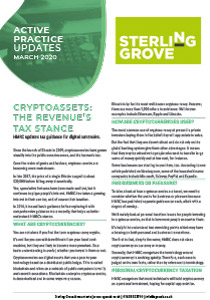Resource Hub
Cryptoassets: The Revenues’s Tax Stance
HMRC updates tax guidance for digital currencies.
Since the launch of Bitcoin in 2009, cryptocurrencies have grown steadily into the public consciousness, and the taxman’s too.
Once the realm of geeks and hackers, cryptocurrencies are becoming more mainstream.
In late 2017, the price of a single Bitcoin surged to about $20,000 before falling away dramatically.
Yes, speculative fortunes have been made and lost, but it continues to pique people’s interest. HMRC has taken a growing interest in their use too, and of course their taxation.
In 2014, it issued basic guidance before replacing it with comprehensive guidance more recently, that helps us better understand HMRC’s stance.
WHAT ARE CRYPTOCURRENCIES?
You are not alone if you find the term cryptocurrency cryptic.
It’s not like you can withdraw Bitcoin from your local cash machine, but they are likely to become more prevalent. So a basic understanding is useful, whether you invest in them or not.
Cryptocurrencies are digital assets that use a peer-to-peer technology based on a distributed public ledger. This is called blockchain and relies on a network of public computers to verify and record transactions. Blockchain underpins cryptocurrencies, is decentralised and in some ways very secure.
Bitcoin is by far the most well-known cryptocurrency. However, there are more than 1,000 others in existence. Well-known examples include Ethereum, Ripple and Litecoin.
HOW ARE CRYPTOCURRENCIES USED?
The most common use of cryptocurrency at present is private investors buying them in the belief they will appreciate in value.
But the fact that they are decentralised and do not rely on the global banking system give them other advantages. It means that they may be attractive to people who want to transfer large sums of money quickly and at low cost, for instance.
Some businesses are starting to use them, too. According to one article published on Nasdaq.com, some of the household-name companies include Microsoft, Subway, PayPal and Expedia.
FOR BUSINESS OR PLEASURE?
To take a look at how cryptocurrencies are taxed, we need to consider whether the use is for business or pleasure because HMRC has published separate guidance on each, albeit with a degree of overlap.
We’ll mainly look at personal taxation issues for people investing in cryptocurrencies, as that is how most people encounter them.
It’s helpful to understand two overriding points which may have a bearing on both personal and business transactions.
The first is that, despite the name, HMRC does not class cryptocurrency as currency or money.
Secondly, that HMRC recognises the terminology around cryptocurrency is evolving quickly. Therefore, each case is judged on its own facts, rather than by reference to terminology.
PERSONAL CRYPTOCURRENCY TAXATION
HMRC recognises that most individuals will hold cryptocurrency as a personal investment, hoping for capital appreciation.
Therefore, the most likely tax scenario will be that of capital gains tax. So you may have to pay a tax on your gains, and you may be able to use losses to offset other taxable gains.
While it can be a speculative activity (Bitcoin value has moved by 65% in one day), HMRC does not consider it gambling.
This is a change of position from its 2014 guidance, so there is no capital gains tax exemption to be had on that front.
CAPITAL GAINS TAX
In the tax year ending April 2020, the capital gains tax rates relating to non-residential property assets are 10% of the taxable gain for basic-rate taxpayers and 20% for higher-rate taxpayers.
Don’t forget you have an annual exemption for your first £12,000 of capital gains in 2019/20.
Capital gains or losses are only crystallised at the point of disposal of the asset. With cryptocurrency this could be a sale for real-world money, exchanging it for another cryptoasset, using cryptocurrency to purchase something or giving away your cryptocurrency (unless to a charity, in most cases).
As with some other assets, further rules apply when you have multiple holdings of the same cryptocurrency which cannot be distinguished. This is known as pooling.
Good record-keeping is essential (it is with all cryptocurrency trades), and this is something to discuss with us if it is relevant.
There are some allowable costs which you can deduct from the value of the cryptocurrency disposal – some obvious, some not.
These include: the initial purchase price, any related transaction fees prior to it being added to the blockchain, advertising costs to find a buyer or vendor, and the professional costs of valuing the disposal and drawing up the contract of the transaction.
Costs for mining or deducting against profits for income tax are not allowable when calculating your tax liability.
One of the defining features of cryptocurrencies is that they don’t have a physical existence. For tax purposes this could present a problem as to which jurisdiction applies the taxes.
On this point, the Revenue takes the pragmatic view of looking at the residency of the beneficial owner (or owners).
INCOME TAX
While some people may consider themselves as ‘traders’, HMRC sets a high threshold to hold this status in their eyes.
However, if this threshold were reached and you had a trading company which posted taxable profits, then income tax would likely supersede capital gains tax.
Equally, if you were to make a loss, then this may be used to offset future income tax liability.
OTHER TAXATION SCENARIOS
What we have outlined so far will cover the majority of people’s forays into cryptocurrencies. However, there are other scenarios which could bring about tax consequences.
Mining is the act of directing your computing power to help produce a cryptocurrency. You are usually rewarded in cryptocurrency for doing this.
HMRC considers whether this constitutes a taxable trade based on how organised the activity is, how much of it you are doing, your risk undertaking and the commerciality of your operation.
If a trade was deemed to have taken place from successful mining or a fee given to you, the benefit would be taxed as income. Capital gains tax may be payable at a future date on any cryptocurrency on disposal.
Airdrops apply when you receive an allocation of cryptocurrency without directly purchasing it, such as receiving cryptocurrency as part of a marketing campaign, for holding cryptocurrency or because you registered to become eligible.
Broadly, if the airdrop was in return for a service from you, then it is likely to be taxable as miscellaneous income or receipts from an existing trade. If it was not, then it won’t be.
As with mining, any future disposal of the cryptocurrency may be subject to capital gains tax.
CRYPTOCURRENCY PAYMENTS & NICHES
If you receive employment income in a cryptocurrency it will be taxed as money’s worth – that’s income tax and national insurance contributions on the value of the asset when it is paid.
Other events that could have tax implications include encountering a blockchain fork, being defrauded or losing access to your cryptocurrency by losing your private key.
Summing up, we hope it is clear that cryptocurrencies are firmly in HMRC’s sights and should not be considered as a way to avoid paying tax. The same applies if you deal with them through a business, for which there is separate guidance.
We can help you ensure you handle your cryptocurrency affairs as tax-efficiently as possible while remaining compliant, but do remember to keep good records of your transactions.
It is not sufficient to rely on your cryptocurrency exchange which may not still be around when we need to submit your tax return.
Contact us today to discuss how we can help you put together a road map that will keep your business on course for growth and success.

